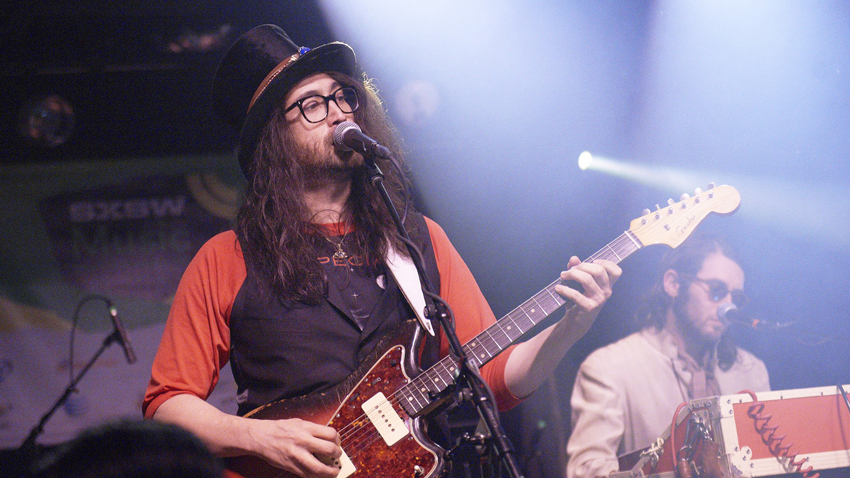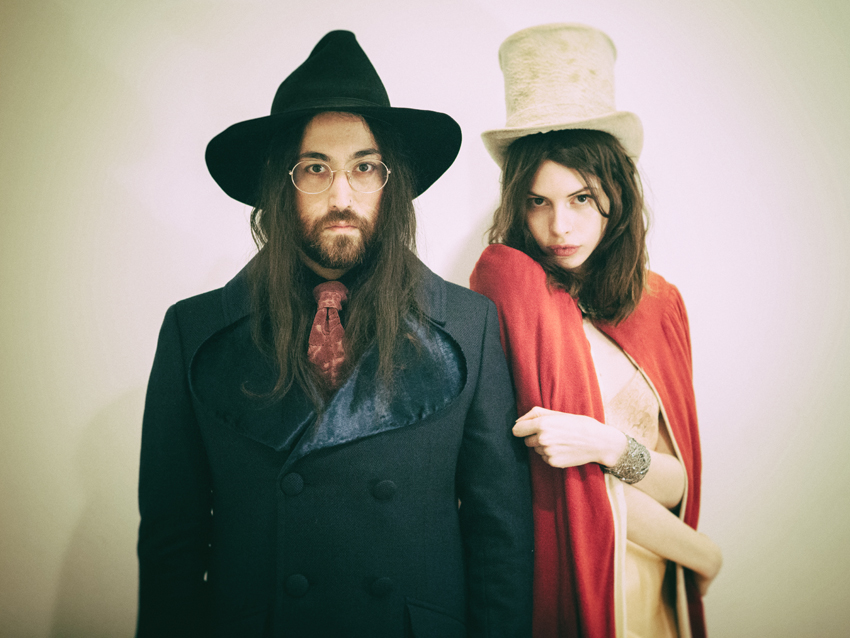
It's taken four years for Sean Lennon and Charlotte Kemp Muhl to follow up the one-two punch of their 2010 releases, the Mark Ronson-produced Jardin Du Luxembourg and the DIY Acoustic Sessions, but the New York City-based postmodern rock duo make up for lost time with their new album, Midnight Sun, due out April 29 via Chimera Music.
"I feel like I'm doing more commercial pop with the Ghost," Lennon says. "Compared to what I do with Mystical Weapons [Lennon's experimental duo with Deerhoof's Greg Saunier], which is like a super-noise band, this music is much more accessible. It all relative, really."
The GOASTT - like Queens Of The Stone Age, when you've got a long name, you get a badass acronym - cover a lot of stylistic and sonic ground on Midnight Sun, veering from the Eastern-flavored Xanadu to the lo-fi garage din of Animals. On the dramatic, Sid Barrett-esque Moth To A Flame, Lennon runs a lap steel through a wah pedal, resulting in a barrage of scorching squalls. "I like trying out things that might not seem like they match," Lennon says. "It's never a good idea to get complacent with one sound or one way of doing things."
On a recent afternoon, Lennon sat down with MusicRadar to talk about Midnight Sun, his go-to guitars, how Greek mythology figured into one of The GOASTT's songs and his ongoing battle with tinnitus.
Do you and Charlotte like to make very elaborate demos, or are the demos the actual recordings?
"Both, actually. Mostly, though, Charlotte and I will write in the studio. We'll lay down some sort of gibberish where the vocal should be, and then if we like the sound of the recording, we'll go home and flesh out the lyrics in the bedroom or something. Then we'll put down a scratch vocal with the lyrics, and from there we'll start to overdub and really experiment with the soundscape. If all that is pleasurable to us, we'll keep going with that vision of the song.
"But we do tinker and tweak. With a song like Last Call, that's a hybrid of three different recordings. I wound up replacing the drums four different times 'cause I was never happy with them. On other songs like Xanadu or Animals, we were very inspired and recorded them in a couple of days. Sometimes Charlotte might come up with a bass right away, so I'll jump on the drums and we'll jam and figure things out in two and a half minutes. So a few tracks were labored over and changed around, and some were raw and went straight to tape."
Get the MusicRadar Newsletter
Want all the hottest music and gear news, reviews, deals, features and more, direct to your inbox? Sign up here.
You say "tape" - now, are you recording to tape?
"We are. We got an Ampex 440 eight-track a couple years ago, and we've been using that for basic tracks. I love tape for the warmth. The Ampex tape machines are really beautiful sounding. For us, we use the Ampex almost like another effect. You can really hear the difference on the drums - there's a fatness to them you don't get with anything else. I don't notice a difference on vocals or keyboards, but drums sound so much better."

Lennon and Kemp Muhl
You and Charlotte play pretty much everything, but do either of you have certain instruments that you favor?
"Yeah, I think Charlotte plays more bass on the record, and I'm more of the drummer and guitar player. Sometimes one person will just grab something - it can work like that. When we play live, I'm on guitar and she's on bass."
The opening track, Too Deep, has such a strong guitar riff. Do riffs come easily to you?
"Actually, that riff was something Charlotte wrote on the bass, so I just doubled it on guitar. That was another one we did live to tape - I was on drums and Charlotte played bass. I love the sound we got. We were both in the same room together, so the bass was leaking into the drums. There's a huge ambience.
"But with riffs, if really depends. That one I didn't write, so all I did was work on the groove. I did work on some counterpoint and descending harmonies on the guitar, but that song was really Charlotte's vision. That riff came out of her brain."
Is the song Don't Look Back, Orpheus really about the Greek mythological figure?
"Yeah. That was something I started writing on an acoustic guitar one day. Charlotte was sitting there and she liked the chord changes. We decided to write it about Orpheus because we had a calliope - it's this old organ from the 1890s that Charlotte bought. Orpheus' mother is Calliope, so we thought it would be cool to have a real calliope playing on an Orpheus-based song. We also put down some very strange harp synths - I have a Chamberlin M4, one of the last ones around. You press a button and you get these really beautiful harp arpeggios. We thought it sounded mysterious, like, 'What would Orpheus play to Hades in Hell?' Orpheus was a lute player - he was like the greatest lute player of all time - and that that's why Hades allowed him to escape from Hell."
Your voice sounds so much like your dad's on that track.
"Mm-hmm."
I know you're probably sick of hearing that. You're in such a unique position here. Nobody compares, say, Robin Thicke to Alan Thicke, but because you're the son of such an iconic artist - and because you do sound like him - it's always going to come up.
"I know what you mean. I've kind of gotten over it; I have to just accept it. I'm always going to remind people of John Lennon, and that's fine. I do sound like my dad. I hear it, and there's nothing I can really do about it."
Do you have any preferred guitars? Anything you grab more than others?
"I do. My favorite guitars are these two Fender Jazzmasters, one from 1961 and another from '67. I use them almost exclusively because I know them so well. I think Jazzmasters are the best-sounding electric guitars that Fender ever made. Plus, a Jazzmaster is about one-tenth the price of a Stratocaster, so it's a win-win for me there. [Laughs]
What else do I have?... I have a Fender Esquire that I use for things that need a really bright, poppy, punchy sound. I also have a Danelectro 12-string that I like to use for trippy, effect-y stuff. I have a lap steel that I've been some slide things. For acoustics, I have a Gibson J-200 and a Martin D-28. I use those on a lot of basic tracks."
I understand that you've had tinnitus for a few years. How bad is it?
"It's not that bad. But you know, I've been playing music since I was 12. I've been playing drums and touring in bands since I was 17. I've played loud, you know? Cibo Matto was a loud band. I was playing with Russell Simins from the Blues Explosion, and he's fucking loud. He probably gave me tinnitus. [Laughs] The problem is intermittent; I don't have it all the time."
Are you doing anything to protect your hearing?
"I'm more careful than I used to be. I might be getting in-ear monitors, so I won't have to play so loud. That's about it. Sometimes I wear earplugs when I go to shows, but I hate the way they change the sound of everything. I should probably do more to protect my hearing."
You always seen to be hanging out with new bands. Anybody you've discovered lately that you want to mention?
"Yeah, there's this band from London called the Fat White Family. I've been hanging out with them a lot. They're pretty awesome. We played together at South By Southwest. They're in New York now. There's a lot of cool bands out there. I always like hearing what people are doing."
Joe is a freelance journalist who has, over the past few decades, interviewed hundreds of guitarists for Guitar World, Guitar Player, MusicRadar and Classic Rock. He is also a former editor of Guitar World, contributing writer for Guitar Aficionado and VP of A&R for Island Records. He’s an enthusiastic guitarist, but he’s nowhere near the likes of the people he interviews. Surprisingly, his skills are more suited to the drums. If you need a drummer for your Beatles tribute band, look him up.










